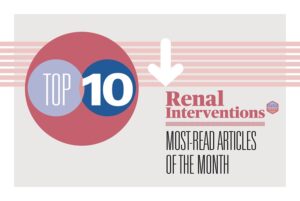 April was a month of dialysis analysis and AVF updates, with end-stage renal disease (ESRD) also associated with adverse limb events in a new study and fistula reuse urged at the Society for Clinical Vascular Surgery (SCVS) 50th Annual Symposium (25–29 March, Miami, USA).
April was a month of dialysis analysis and AVF updates, with end-stage renal disease (ESRD) also associated with adverse limb events in a new study and fistula reuse urged at the Society for Clinical Vascular Surgery (SCVS) 50th Annual Symposium (25–29 March, Miami, USA).
The AVeNEW study, a 24-month multicentre, international, prospective and randomised clinical trial published results investigating percutaneous transluminal angioplasty (PTA) compared to PTA with placement of a covered stent for the treatment of arteriovenous fistula (AVF) stenosis.
The SCVS 2023 meeting hosted a series of abstract presentations. Among them was one by Bianca Mulaney and colleagues including Elizabeth George (both Stanford University, Stanford, USA) on the cost effectiveness of endovascular arteriovenous fistula (endoAVF) creation when compared with surgical AVF (sAVF) creation.
More patients undergoing maintenance haemodialysis for kidney disease have expressed a preference for a comfort-focused treatment over one that lengthens their life as much as possible in a new study published in JAMA Internal Medicine. The findings suggest “important opportunities to improve the quality of care” of dialysis patients, say lead author Susan P Y Wong (University of Washington, Seattle, USA) and colleagues.
A new investigation into the association between end-stage renal disease (ESRD) and major adverse limb events (MALEs) has found that not only is it strong, but ESRD is particularly associated with below-knee amputation. The details of the study were presented at the Society of Interventional Radiology (SIR) Annual Scientific Meeting (4–9 March, Phoenix, USA).
Medtronic and DaVita announced the launch of Mozarc Medical—an independent new company that, they state in a press release, is “committed to reshaping kidney health and driving patient-centred technology solutions”.
Led by Hyangkyoung Kim (Ewha Womans University Medical Center, Seoul, South Korea) and featuring corresponding author Hoon Suk Park (The Catholic University of Korea School of Medicine, Seoul, South Korea), a study published in Hemodialysis International has found that arteriovenous fistulas (AVFs) are a safer and more effective option for end-stage kidney disease patients aged ≥ 65 years than arteriovenous grafts (AVGs).
Humacyte, a clinical-stage biotechnology platform company developing universally implantable bioengineered human tissue at commercial scale, has announced that it has completed enrolment of a Phase 3 trial in haemodialysis access. The V007 trial is designed to assess the efficacy and safety of its Human Acellular Vessel (HAV) product in establishing vascular access for haemodialysis patients with end-stage renal disease (ESRD) as compared to autogenous arteriovenous fistulas (AVFs).
“Recycle that vein!”—that was the appeal from the authors of a new study that trialled the explantation of mature arteriovenous fistulas (AVFs) from patients with venous outflow obstruction in one extremity and translocation of them to the contralateral extremity. Led by Guillermo A Escobar (Emory University, Atlanta, USA), the small study’s abstract was put to the audience at the SCVS 2023 meeting and presented by Brandi Mize (Emory University).
A new study published in Hemodialysis International has found that minimum staffing regulations for haemodialysis facilities may not be associated with improved patient outcomes. Led by Allan Jacob (Physicians Dialysis, Miami, USA) and featuring corresponding author Edward Timmons (West Virginia University, Morgantown, USA), the authors have called for research on such regulations at the facility level.
A new proteomic risk model for cardiovascular disease in chronic kidney disease (CKD) patients has been found to be more accurate than current methods of measuring cardiac risk, according to a new study led by researchers in the Perelman School of Medicine at the University of Pennsylvania (Philadelphia, USA). The study is published in the European Heart Journal.











